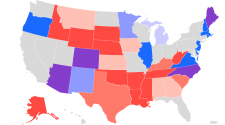British ministers are to snub a major new “alliance for multilateralism” being launched by France and Germany at the United Nations general assembly this week in a fresh sign of how Brexit is shifting British foreign policy.
The alliance, due to be launched by the German foreign minister, Heiko Maas, and the French foreign minister, Jean-Yves Le Drian, is intended to act as a bulwark against what Le Drian has described as “the wilding of the world” and the abandonment of the rules-based order set up after 1945.
The initiative, in the planning for six months, has inevitably been seen as a thinly veiled rebuke to the increasingly vocal advocates of national sovereignty such as Donald Trump.
The alliance’s first meeting in New York on Thursday is due to be attended by more than 50 ministers but Britain is not sending a minister, and has declined to sign five of the six declarations linked with the initiative.
The alliance is regarded by France and Germany as its most important joint diplomatic response to nationalism, and the British refusal to embrace the plan underlines how much Brexit may lead to a wider parting of the ways between the UK and Europe.
In the past in debates between advocates of national sovereignty and multilateralism, the UK has always sided with the multilateralists.
Countries that have signed up to the agreement, according to Le Drian, include France, Germany, Japan, Canada, Chile, Mexico, Singapore, Ghana and others. Le Drian made no mention of the UK. He said: “The symptoms of a true wilding of the world accumulates, putting in peril the multilateral edifice which we collectively developed, as we learned the lessons of two great world wars.”
The aim he said “was to give a voice to the immense majority of countries that believe in the efficiency of international cooperation”.
Calling the alliance an ambitious humanist project for the 21st century designed “to fight those that are destroying the international order”, Le Drian said the multilateral structures built after the second world war did not threaten national sovereignty.
Instead, he said such structures were “a collective guarantee and protection against the law of the strongest, including basic humanitarian law that protects civilians in time of war. Multilateralism is both a method and a goal. In a word multilateralism is humanism.”
Confirming the British ministerial absence from the launch on Thursday, a French government spokesman said the alliance was never intended to be a membership group with formal participation but instead an organisation for cooperation.
He said the UK supported one of the six initiatives, which are headed: call for trust and security in cyberspace, international partnership for information and democracy, joint position of the group of friends on climate and security, education; equality at the centre initiative and finally, 11 principles on lethal autonomous weapons systems.
The move came in the wake of the US president cutting funding for the United Nations, withdrawing from the UN human rights council, Unesco and the Paris climate agreement.
Le Drian and Maas stressed their initiative was not directed against the US, and Maas added that he would be happy to see the US join the effort.
Maas claimed multilateralism was under threat, adding that “all of those who want to join such an initiative [should] also declare themselves to be multilateralists. In the end, everyone will have to decide on which side they’re on.
“Whoever wants to join us can join us – it is against nobody,” said Mass.
Critics on the left claim the plan is in fact primarily in France and Germany’s national interests since they are the great beneficiaries of the status quo, and so are reluctant to reform institutions to allow currently marginalised nations a greater stake. Others have criticised the plan for being too vague, or duplicatory of the UN’s work.
















